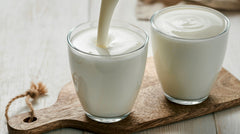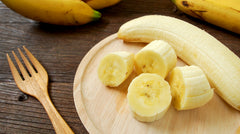Squash Pain with This Delicious Ancient Wonder

“Why do you build me up, butternut baby, when I feel run-down ...” Maybe that’s not exactly how the song goes, but butternut squash can help build up your health because it’s chock full of powerful nutrients. Not only is this squash loaded with vitamins C and A, it also has B vitamins, manganese, vitamin E, and other remarkable nutrients.
Yet, butternut squash isn’t just good for you. This ancient food from Mexico is also sweet and delicious. In fact, Australians even call it the “butternut pumpkin” because of its pumpkin-like taste. What’s more, butternut squash is such a close relative of the pumpkin you can substitute it for pumpkin in recipes.
So, look for this yummy, long-necked squash during the cool weather months. You’ll recognize it by its gold-kissed beige color and its unique round-bottomed vase shape.
Win the war against arthritis.
Around 7 million people in the United States battle the pain of rheumatoid arthritis (RA), but you don’t have to become one of them. Eating delicious butternut squash regularly can give you two powerful arthritis preventers — vitamin C and beta cryptoxanthin.
According to Mayo Clinic research, beta cryptoxanthin is an antioxidant that may help lower your risk of rheumatoid arthritis. Other things that might lower RA risk include fruits and cruciferous veggies, like cabbage, and the mineral zinc.
On top of that, beta cryptoxanthin and vitamin C may help prevent RA by defending your body against another form of arthritis called inflammatory polyarthritis — the inflammation of more than one joint. Research suggests people who develop inflammatory polyarthritis may be more likely to get rheumatoid arthritis later.
But getting the right nutrients may help. An English study found that people who got the least vitamin C from their diets have three times as much risk of inflammatory polyarthritis. And another study suggests that people who eat the most foods rich in beta cryptoxanthin are at less risk of inflammatory polyarthritis.
Start avoiding arthritis with butternut squash and other rich sources of vitamin C and beta cryptoxanthin — like sweet red peppers and orange juice.

Squelch a stroke with squash power.
Even if you’re already taking diuretics for high blood pressure, you can still lower your risk of stroke. A study from the Queen’s Medical Center in Hawaii found that people who ate the least potassium had a higher risk of stroke even if they already took diuretics. A recent review of research confirms that eating plenty of foods high in potassium lowers your stroke risk. What’s more, eating potassium rich-produce slashes your risk of dying from a stroke if you ever have one. And that’s not all.
Butternut squash is also a good source of magnesium. Since magnesium deficiency has been linked to stroke, you can’t afford to scrimp. Learn to love butternut squash but add extra sources of potassium, like baked potatoes, white beans, dates, and lima beans, as well as magnesium- rich foods, like halibut, spinach, and black beans.
Scare off a cluster of cancers.
Butternut squash is also a triple-threat against 10 different kinds of cancer. That’s because it supplies you with three powerful cancer fighters — vitamin A, beta carotene, and vitamin C.
Research shows a shortage of vitamin A may raise your risk of cancer, but a cup of butternut squash cubes delivers your daily recommended amount of vitamin A and then some. The squash’s secret is its treasure trove of beta carotene, which your body turns into cancer- blocking vitamin A.
Even better, getting enough beta carotene and vitamin C may cut your risk of a number of cancers — colon, esophagus, stomach, pancreatic, lung, rectal, prostate, breast, ovarian, and cervix. Don’t forget that a cup of butternut squash cubes is a great start on your vitamin C for the day, and it has all the daily beta carotene experts recommend.

- Tags: Allergies Arthritis Brain & Memory Cancer Diabetes & High Blood Pressure Digestion Fatigue Health & Healing Healthy Living Healthy Recipes Healthy Shopping & Cooking Heart/Cholesterol/Blood Pressure Heartburn Immunity & Infections Money-Saving Secrets Muscle aches & pain Muscles & Sprains Smart Living Smart Money Stress/Mood/Depression Weight Loss & Fitness
- FC&A Staff Writer







